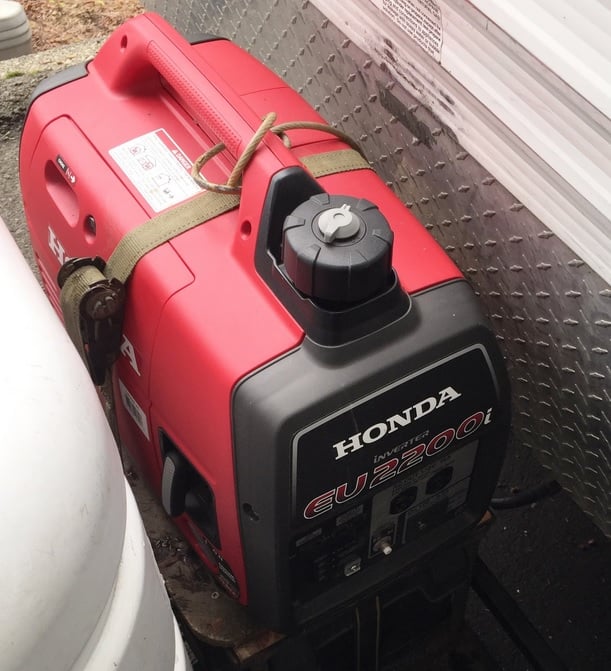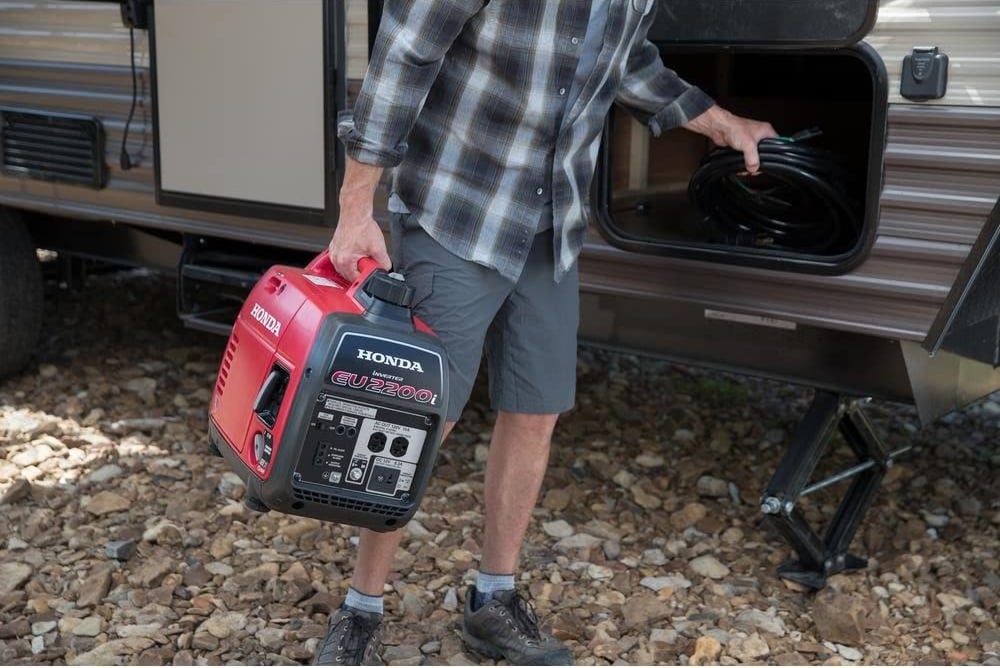
Without shore power, the average RVer is unable to operate any 120-volt appliance or operate their RV’s converter charger. This is the primary source for keeping the RVs house batteries charged. Without charged house batteries, most of your RV’s systems will fail to operate correctly, if at all.
Features to look for in a camping generator for boondocking
Most RVers that boondock, especially those just starting out, will want to consider buying a portable camping generator to supply their RV with electrical power when needed if their RV is not already equipped with a built-in generator.
Output
First and foremost, don’t buy into the myth that you need a generator with an output that matches your RV’s electrical service panel. You most likely do not need a generator that puts out 30 amps of 120 volt AC (alternating current) or 3,600 watts if your RV has a 30 amp plug on it. Determine the rated output of the generator needed by calculating your electrical needs. Things to consider:
- What 120-volt appliances, if any, do I want to operate? Most RVers want to be able to operate their air conditioner(s) which is typically the highest power requirement.
- Is there a way to minimize the power requirements of the appliance(s) I want to operate? The electrical needs for starting an air conditioner(s) can be significantly reduced with a SoftStart product, hairdryers can be run on the styling setting rather than high, etc. If an air conditioner is part of your equation, please take the time to educate yourself on the electrical needs during the startup process of the unit and ways to manage/reduce the load.
- Will I be operating more than one appliance at a time, like the air conditioner and microwave?
- Is there an acceptable alternative to the 120-volt appliance I want to operate when boondocking? Click here to see some alternatives.
- Can I turn off other 120 volt appliances to maximize (redirect) available generator power to the appliance I need to operate? Turning the RV absorption refrigerator to LP Gas or turning off the charger in your RVs converter charger for example.
- Maybe you only need to keep your house batteries charged via the converter charger?
Once you have considered all of the above, just add up the power requirements of each and the total will be the minimum rated size of the generator you will need.
Type
Damping generators come in a variety of types. Some things to consider:
- Inverter generators have a microprocessor built-in which regulates voltage to protect sensitive electronics.
- Contractor generators fluctuate while operating producing “dirty power” with unstable frequency and voltage output which can damage sensitive electronics.
Noise
How comfortable are you with noise? More importantly what are your neighbors, if you have any in the boondocks, willing to tolerate?
- Inverter type generators, which are quiet and enclosed in a case
- Contractor type generators are noisier and not enclosed
Fuel
Portable camping generators typically operate on gasoline but are also available in propane or even diesel. Considerations for which fuel type is best include:
- What type of fuel does the engine in your RV operate on? Owning a generator that uses the same type of fuel eliminates the need for using two different fuel pumps at the filling station or carrying two types of spare fuel.
- Diesel fuel is not nearly as volatile as gasoline.
- A properly operating propane generator produces much less carbon monoxide than a gasoline generator. Propane gas won’t degrade overtime like gasoline. You can’t spill propane gas.
Physical size & weight
- Is there somewhere I can safely (think fuel, fumes, and theft) store the generator in my RV or tow vehicle?
- Will the generator fit in the space I want it to?
- Will I be able to lift the portable generator in and out of its storage space when needed?
Other considerations
The generator output is listed as surge and rated capacity. As the name implies, surge capacity is a short burst of extra energy the generator is able to produce to help start motors like those found in RV air conditioners.
Make sure the electrical connections such as the output plug on the generator and park adapter, if needed, are rated for the maximum electrical loads you expect the RV will be drawing. Example: Don’t use a 15 to 30 amp park adapter if the expected maximum load is 20 amps and the generator is rated to produce 20 amps or more.
Keep in mind that internal combustion engines lose approximately 3% efficiency for every 1,000 feet of elevation gained. This will impact the rated output of a generator and how much electrical power it can produce in the mountains.

I prefer a 2,200-watt Honda generator. Photo via Amazon
Why I carry a Honda generator for boondocking
For years I only traveled with a 1,000-watt Honda generator (1,000 surge watts, 900 rated watts) when boondocking. It was lightweight, quiet, and produced enough power to meet our needs. It even ran my wife’s hairdryer on low. And it charged the house batteries in our travel trailer.
Recently I have been traveling more in the summer on business and found myself in areas where it is nice to be able to run the air conditioner when boondocking.
I upgraded to a 2,200-watt Honda (2,200 surge watts, 1,800 rated watts) and installed a SoftStart device. This significantly reduces the power needed by my RV’s air conditioner to start up. The start up current went from 28 amps to 13.5 amps. These units are small enough that I can carry either one behind the LP tanks on my travel trailer.
Both units operate on gasoline as does my tow vehicle, motorcycle, and ATV that we carry with us. I can either fuel the generator while fueling my tow vehicle or from the spare cans of fuel I carry for refueling the motorcycle and ATV in the field, negating the need for carrying other types of spare fuel.
The best camping generator for boondocking depends on your RV use.
Your generator choice depends on your lifestyle, and your electrical needs. Use the guidelines above and read online reviews. Then talk with others on forums like iRV2 to decide what best fits your needs.
You may also want to consider a solar power setup. Here Are 5 Reasons Why We Prefer Solar Power Over A Generator

Great article thank you
I also have the Honda 2200; I’m curious about the safety of storing it in the travel trailer. I carry mine in the bed of my pickup. Is it safe to carry it inside? What if it developed a gas leak?
I converted my 2200 to also use propane.
Easy to do and now I don’t have to carry any gas cans.
Wishart, I think you already answered your own question. No it is not safe as it may develop a gas leak along with a host of other potential safety issues.
I wouldn’t carry any generator inside a trailer or camper as the plastic gas caps tend to leak gas fumes big time. Also, if you have any kind of electric filter such as the progressive models (and you should), then you’ll need a ground/neutral adapter. The inverters carry a floating neutral that triggers an “open ground” error on the filter and won’t let the inverter connect to your camper.
Closed frame inverter generators can overheat and there electronics burn out and it’s not fixable.
I opted to replace my broken one with the new open frame rv inverter style generator. 30 amp plug 70 lbs 70 db.
Works for me your opinion may differ.
While Hindainvertors have been top notch they are pricey. You can get CHAMPION INVERTORS of a small size that can ran together if needed as can Honda and others. I have a champion 3400 dual fuel, that works great for me running A/c, tv etc. we rarely microwave. Read reviews, check out the “Long long honeymoon” you tube and page as they do great reviews on these items.
70db won’t meet the noise criteria in most National or Private campgrounds!
I recently took my fifth wheel on an extended trip out West with lots of boondocking (Harvest Host, etc). Having looked at all of the normal options (generators, solar) I rejected these in favor of adding an independent second alternator to my truck engine along with a pair of six volt deep discharge batteries that provides 340AH of capacity. Along with a small AC inverter the mod worked out great. I can run most every DC appliance or light for long periods and naturally occurring day time trips with the truck auto restores the batteries. Of course no A/C but who cares in the Spring and Fall
Harbor freight inverter generators have served me well.
As you get older two Little ones are easier to handle than one big one.
I am boondocking at the Oshkosh Airshow.
Anyone that shows up with a loud contractor generator…
A pox on your house.